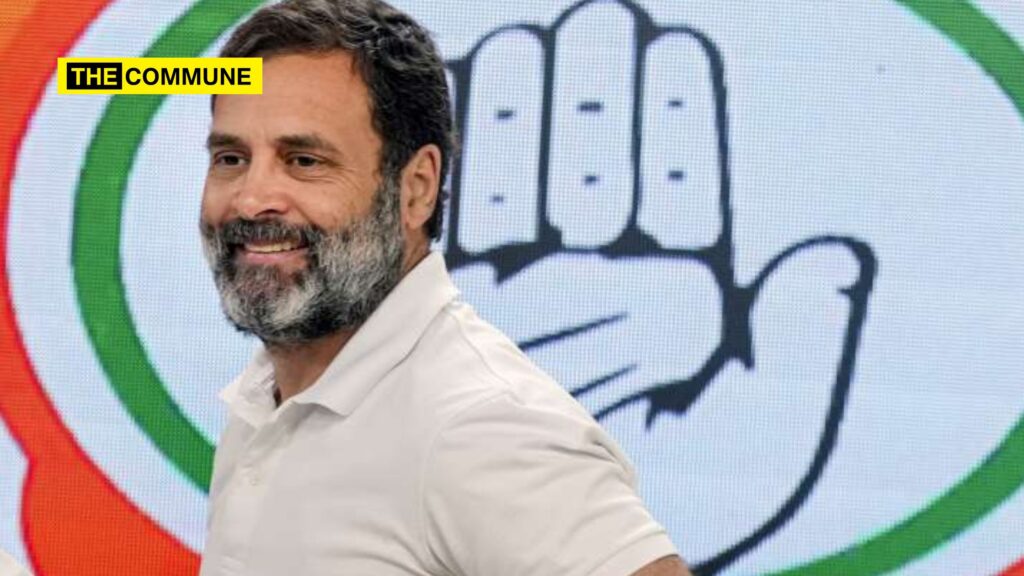Congress party leader Rahul Gandhi on Friday (22 September 2023), in a press conference held at the AICC headquarters in New Delhi, said that Members of Parliament are powerless like murtis (idols) in mandir (temple).
In particular, the unaccountable scion of the Congress party further lamented that MPs from the Other Backward Class (OBC) have been “stuffed” in Parliament like idols without a voice in the temple.
An increasingly unhinged Rahul Gandhi who in the last two weeks had made some bizarre claims in Brussels during the crucial G-20 summit said, neither MPs from his Congress party, nor the BJP, nor any other MP from India (presumably I.N.D.I Alliance) have any power or say in running this country.
Rahul Gandhi- MP's/ OBC MP's have been made Powerless like Murtis (idlos) in Mandir (Temple) pic.twitter.com/su02RCVn6g
— Megh Updates 🚨™ (@MeghUpdates) September 22, 2023
It was a very ironic statement made by Rahul Gandhi since his own party president Mallikarjun had gagged senior leaders from making comments that end up praising PM Modi after Chhattisgarh Deputy Chief Minister TS Singh Deo thanked the Centre’s support for the state’s welfare. So, it is Rahul Gandhi and his party who wants their leaders to do idol worship of one family, the Gandhi family.
It must be noted that Rahul Gandhi who had been dismissed from the Parliament but later reinstated has a pathetic record in terms of attendance and the number of questions asked.
According to the PRS Legislative Research database, during the period from 2009 to 2014, Rahul Gandhi had an attendance rate of 43%, whereas the national average stood at 76%, and the state average for MPs from his former constituency in Uttar Pradesh (UP) was 79%. Throughout this period, Rahul Gandhi participated in only two debates, while the national average was 37.9, and the state average was 43.9. Additionally, he did not ask a single question during these five years and did not introduce any Private Member’s Bills.
In the 16th Lok Sabha, spanning from 2014 to 2019, Rahul Gandhi’s attendance did witness an increase from 43% to 52% in Parliament. However, the national average was 80%, and the average for his state of UP was 86%. During this time, he did engage in 14 debates, although he still lagged significantly behind the national average of 67.7 and the state average of 109.6. Notably, he did not pose any questions or introduce any Private Member’s Bills during this period.
In the 17th Lok Sabha, from 2019 to the present, Rahul Gandhi’s attendance remains at 52%, while the national average stands at 79%, and his state average for Kerala (as he lost his seat in UP) is 83%. Surprisingly, he participated in six debates, although he still falls considerably short of the national average of 41.3 and the state average of 68.7. He did ask 94 questions, yet this number remains significantly below the national average for questions, which was 170, and the state average of 225. Since 2019, he has once again refrained from introducing any Private Member’s Bills, maintaining his consistent record.
It must be noted that his attendance was 0% in the monsoon session in 2020 and the winter session in 2022. There are some mentions when he gave the motion of thanks to the President in 2022 and 2023 took part in the Budget discussion in 2021 and raised one submission and one special mention.
However, Rahul Gandhi’s overall performance in Parliament is abysmal. Another crucial aspect to consider is his infrequent attendance at important bipartisan parliamentary committee meetings. Currently, he is a member of a critical parliamentary committee on defense. Ironically, he has expressed admiration for China and its Belt and Road Initiatives, even as India has made significant strides in building a consensus to develop the India-Middle East-Europe Corridor. This ambitious project aims to establish a comprehensive transportation network, including rail, road, and sea routes, as a strategic response to China’s Belt and Road Initiative, ultimately enhancing stability in global supply chain management.
It is evident that Rahul Gandhi’s absenteeism from Parliament, limited participation in debates, and failure to ask questions are not due to helplessness but rather a lack of diligence. Additionally, when he referred to “Murtis” as powerless, it highlighted his limited understanding of Sanatana Dharma and our temples. A closer examination of the architecture and construction of Hindu temples reveals that they were meticulously designed with ancient scientific knowledge of sound and vibration management. These temples are considered extensions of the human body.
The idols placed within Hindu temples undergo rigorous selection processes, and they should not be perceived merely as rocks. These idols are crafted from metals and minerals, far from the inert stones that some might imagine Hindus worship. These idols are composed of elements from the Earth, and the vibrations they emit impact our bodies when sacred mantras are chanted. These mantras possess specific vibrations, creating a potent energy field. Interestingly, Hindu Sanskrit Mantras exhibit a precise golden ratio of 1.618 sound harmonics (Fibonacci/Sri Yantra) with digital mathematical and geometrical precision. The Sri Yantra is based on this ratio.
Chanting the OM sound brings us into harmonic resonance, with OM performing at 432 Hertz, considered the Universe’s natural musical voice.
But for Rahul Gandhi, the idols in temples are nothing more than ‘powerless’ stones. By calling idols as powerless, Rahul Gandhi either lacks an understanding of temple idols or considers it to be a shirk like his ‘secular’ vote bank.
(Balaji is a political commentator and columnist. He tweets at @LaxmanShriram78)
Click here to subscribe to The Commune on Telegram and get the best stories of the day delivered to you personally.

